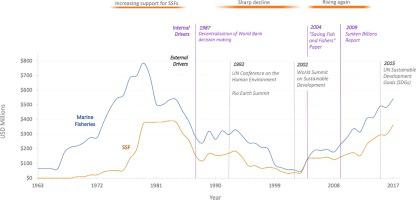Global Environmental Change ( IF 8.6 ) Pub Date : 2021-03-15 , DOI: 10.1016/j.gloenvcha.2021.102246 Jill Hamilton , Xavier Basurto , Hillary Smith , John Virdin

|
Small-scale fisheries are becoming a global social and environmental concern. The contribution of marine small-scale fisheries to global food security and coastal livelihoods, coupled with the significant challenges they face, has attracted increasing attention and aid from environmental organizations, philanthropies, and multilateral agencies over recent decades. Our study attends to the understudied role of the World Bank, the largest individual funder shaping present and future sustainability of coastal marine regions, as a key actor shaping global environmental governance paradigms. We asked how funding to the sector has changed over the last 50 years and why, outlining distinct patterns in the flow of small-scale fisheries aid and the underlying intervention models. We contextualize our quantitative analysis of aid patterns over time with qualitative interview data with bank staff, identifying underlying paradigm shifts driven by internal and external factors. More than $2.48 billion was allocated by the World Bank to marine fisheries over the last 50 years, approximately 47% (~$1.17 billion) of which was targeted to marine small-scale fisheries. Three distinct funding periods are identified: rising support to SSF from the 1970s to mid-1980s; a sharp decline in funding in the mid-to-late 1980s and low levels of funding throughout the 1990s; and a steady return to funding SSF in the mid-2000s up to the present. Over time, Bank-funded interventions shifted from pure economic development in the earlier era, to an emphasis on governance and multi-dimensional environmental goals in the recent period. To understand why, we used key-informant interviews to unpack major internal drivers: internal staff changes and presence of key individuals, the decentralization and recentralization of decision-making, and the organization’s shifting emphasis from traditional economic growth to multi-dimensional objectives of poverty reduction, among others. External drivers behind funding and paradigm shifts included pressure from the environmental movement, the rise of sustainable development discourses, key global environmental summits in the 1990s, and rising levels of interest in the fisheries sector by the governments of both donor and recipient countries. Processes of ‘paradigm shifts’ were not swift or singular, rather they were affected by multiple, convergent factors over time. Our findings contribute to the literature on multi-lateral institutions as key actors in environmental governance shaping global development thinking, illustrating the arc of the last half-century of fisheries aid at the Bank while highlighting present dilemmas and future challenges that actors interested in working towards sustainable marine small-scale fisheries face.
中文翻译:

世界银行如何塑造沿海地区的全球环境治理议程?50年的小型渔业援助揭示了范式随着时间的推移而发生的变化
小型渔业正在成为全球社会和环境关注的问题。近几十年来,海洋小型渔业对全球粮食安全和沿海生计的贡献,以及它们面临的重大挑战,引起了环境组织,慈善机构和多边机构的越来越多的关注和援助。我们的研究关注的是世界银行作为塑造全球环境治理范式的关键角色,而世界银行的角色并未得到充分研究,后者是塑造沿海海洋地区目前和未来可持续性的最大个人出资者。我们询问了过去50年对该部门的资金变化如何以及为什么,概述了小规模渔业援助流动的基本模式和基本的干预模式。我们通过对银行工作人员的定性访谈数据,对随时间推移的援助模式进行定量分析,从而确定由内部和外部因素驱动的潜在范式转变。在过去的50年中,世界银行向海洋渔业拨款超过24.8亿美元,其中约47%(约11.7亿美元)用于海洋小型渔业。确定了三个不同的供资期:从1970年代到1980年代中期对SSF的支持不断增加;在1980年代中后期,资金急剧减少,在整个1990年代,资金水平很低;并在2000年代中期到现在稳定地为SSF筹集资金。随着时间的流逝,世行资助的干预措施已从早期的单纯经济发展转变为近期对治理和多维环境目标的重视。为了理解原因,我们使用了关键信息面谈来剖析主要的内部驱动因素:内部员工变动和关键人物的存在,决策权的下放和重新集中化,以及组织将重点从传统的经济增长转移到贫困的多维目标上减少等等。资金和范式转变背后的外部驱动力包括来自环境运动的压力,可持续发展论断的兴起,1990年代主要的全球环境峰会以及捐助国和受援国政府对渔业部门的兴趣不断提高。“范式转换”的过程并非迅速或奇异,而是随着时间的推移受到多种趋同因素的影响。











































 京公网安备 11010802027423号
京公网安备 11010802027423号